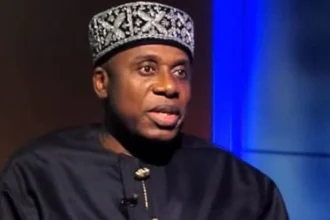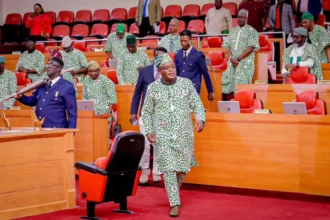...To get all news updates, Join our WhatsApp Group (Click Here)
Also Join our WhatsApp Channel (Click Here)
Additional details have emerged concerning the ownership structure of the company that is set to acquire Oil Mining Lease 29 (OML 29) and the 60-mile Nembe Creek Trunkline sold by Shell and its partners in a $2.562 billion deal. As previously reported, Shell, operator of the oil lease, has sold its 30 percent stake in the oil field and pipeline, while France’s Total Global and Italy’s Eni S.p.A. have sold off their 10 and 5 percent stakes, respectively, to local investors.
The remaining asset balance of 55 percent will be retained by the Nigerian National Petroleum Corporation (NNPC) under a Joint Operating Agreement (JOA). Contrary to erroneous reports, the Aiteo Group-led consortium – not Taleveras Group – is the majority stakeholder in the deal with an 85 percent equity stake. In a statement issued by Mrs. Oseyemi Oluwatuyi of the Communications Department of the Aiteo Group, “Therefore, it is total misinformation in the local and international media that it is the ‘Taleveras-led consortium’ that acquired OML 29 divested by Shell,” she said.
Mrs. Oluwatuyi further noted that it had become necessary to correct the misleading media reports about the acquisition of OML 29, the most prolific of the oil blocks sold off by Shell, after noting the discrepancy reported on numerous occasions. “The Aiteo Group, whose major business areas include exploration and production, issued this statement in order to clarify various print and online media reports that carried misleading stories about the details of the transaction,” she added. Mrs. Oluwatuyi also corrected the block’s price, putting the total cost of acquisition at $2.7bn, stating that while $2.562bn was the actual cost for the acquisition of the block and Nembe pipeline, additional funds have also been earmarked as working capital.
A breakdown of the shareholding structure cited by THISDAY supports Mrs. Oluwatuyi’s figures, reporting the number of shares held by the consortium at 2.7 billion units, with Aiteo Energy Resources Limited holding a total volume of 2.294 billion shares, Tempo holding 270 million shares with its 10 percent equity, and Taleveras holding 135 million shares. The Africa Oil & Gas Report has put OML 29’s proven and probable reserves (P1+P2) at about 2.2 billion barrels of oil equivalent (BOE), while its hydrocarbon fields could deliver as much as 160,000 barrels of oil per day and 300 million standard cubic feet of gas per day (mmsc/d) at peak output.
While the Aiteo Group consortium beat out several indigenous and international companies as the preferred bidder for OML 29 and the Nembe pipeline, not everyone walked away empty-handed in the sale of onshore oil blocks. The Erotron Consortium, for example, won the bid for OML 18 – having offered $1.2bn for the oil block; Pan Ocean Oil Corporation Nigeria Limited, operator of the NNPC/Pan Ocean Joint Venture, clinched OML 24 after submitting a bid of $900M; and Crestar managed to secure OML 25 for $500M.
You can get every of our news as soon as they drop on WhatsApp ...To get all news updates, Join our WhatsApp Group (Click Here)
Also Join our WhatsApp Channel (Click Here)









